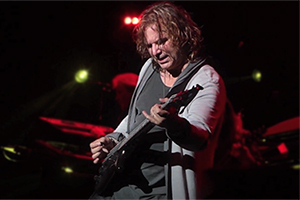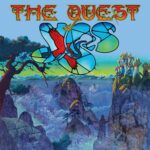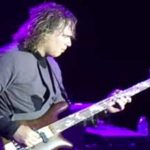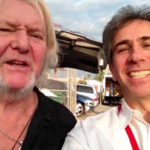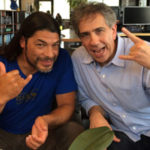Yes bassist talks about honoring his friend Chris Squire’s legacy on the group’s new album
Exclusive interview with FBPO’s Jon Liebman
October 4, 2021
These days, multi-instrumentalist Billy Sherwood is probably most famous for replacing Chris Squire as the bassist and backing vocalist for Yes. In addition to his work with the legendary prog-rock outfit, he’s also active with the bands World Trade and Circa, and was a member of the now-defunct group Lodgic. Over the years, Sherwood has collaborated with Marty Walsh of Supertramp, Manfred Mann, Motörhead, Toto, and Edgar Winter, and helped assemble prog-rock supergroup The Prog Collective. Sherwood was first a member of Yes as a guitarist and keyboardist, from 1997 to 2000, and was subsequently handpicked by Squire as his replacement. The new album from Yes, Quest, was released on Oct. 1.
FBPO: A lot’s happened since your first interview with us in 2015. How have you been holding up?
BS: Boy, yeah. It’s hard to imagine it’s six years plus later, man, but a lot has happened and it’s moving forward. New album coming out, and just waiting for COVID to be over and get back on tour.
FBPO: The new album certainly didn’t come without its share of challenges, but in spite of everything, you must be pretty happy with the end result.
BS: I’m very proud of the record for many reasons. The first record without Chris is a rough one, but I tried to honor his legacy and bring his spirit to the table as much as possible and maintain my own thing within that. I think it’s a good record. It came out really, really well, all things considered. With COVID and not being able to get together in person, it still felt like we were all in the same room.
FBPO: Tell me about the recording process. Some of you were locked down in America, some in England, some in Barbados… How did you manage all that?
BS: We were doing a lot of file sharing, which I’m quite used to, but I did have the pleasure of working Alan White for two weeks here in L.A. I recorded the drums and we tracked and made sure that rhythm section “engine room” thing, was working as it should, and that sort of set a foundation for things. And then, obviously, all the work that the other guys did is great. It was all done pretty much file share, with the exception of, I think Steve and Geoff (Downes) got together in England. At one point, Jon (Davison) was able to get over there, but it’s the modern way of doing things, I suppose. I’d imagine in the future, if we make another album downrange, we’ll probably all be in the same room.
FBPO: I really like the positive message in Quest. It reminds us that so much of our destiny is in our own hands.
BS: And in front of us, not behind us, you know? We’re moving forward at a rapid pace. It’s a hopeful album. Looking to the future is what it is.
FBPO: I also love that, while looking forward, there’s still a definite feeling of holding onto that traditional classic Yes sound. I mean, it absolutely sounds like a Yes record.
BS: I think that’s the ingredients involved. Maintain that, and you take that, and you move forward with that. And that hybrid is very well shown on the record, I think, quite well.
FBPO: Being the bass player on the band’s first-ever album without Chris must have evoked some strong feelings in you.
BS: Well, yeah. It’s an emotional thing, and it’s also a sort of a spiritual thing, wanting to make sure his spirit is felt on that record, and so I tried to walk that line between coming up with my own stuff and thinking about, “Well, what would Chris do here?” I mean, in a way, the song, “The Western Edge” was very much inspired by Chris because I grabbed my bass one day, I was just noodling around and started playing this low E with this melody rising up on top, playing its own thing against the chords. And I just flashed on Chris and me being back at his studio and working together, that being something he would have come up with. So I felt pretty good about the things that were coming up, and I hope the Yes fans do as well. I mean, it was a big step going onstage without him, but the fans were so welcoming, and warm, and dug it so much. That was the support system that I sort of needed. I feel the same way about this record. I think that Chris’ spirit is honored and there’s also a new thing brought to the table.
FBPO: You and Chris got to know each other pretty well. How do you think he’d react, knowing you had wondered, “What would Chris do?” I have a hunch he’d say, “No, no, Billy, I want you to do what you want to do.”
BS: Well, he was funny. One time, working on the second Conspiracy (band) studio record called The Unknown, I was playing this bit from the very last track, and Chris was composing the bass part and he was on his way to the studio. When he showed up, I said, “What do you think of this bass line?” He goes [in a British accent] “Oh my God, you sound more like me than I do!” He said, “Just push it for God’s sake.” I said, “No, wait. You need to play this.” He says, “No.” I couldn’t talk him into playing it, so I got to finish it. And it’s got this one little bit where it’s really high up on the neck, and as I rise to that note, he looks at me. He goes, “I would wiggle that note a little bit.” So I handed him the bass, and he goes, “No, no, no. You’ve almost got it. You’ve almost got it.” [Laughs]
FBPO: You two had quite a rapport.
BS: We had a funny relationship in that way. But I’d done my homework on Chris Squire decades previous, so I knew all the nooks and crannies. But being able to stand next to him onstage was a whole other thing, and to watch the little things that he would do. How he would slide up to certain things and then bring it back down to the root note and that dramatic moment, and the double picking involved. So I picked up on all of his tricks as well, and would throw them back at him in the studio in certain ways. He’d go, “Hey, wait a minute.” It was funny. It was a very loving relationship on a musical level. You know, when we were in that mode. That’s for sure.
FBPO: You’re very much paying homage to Chris and honoring him, but there’s plenty of Billy Sherwood in those lines too. I think you’ve found that sweet spot.
BS: Right on. Thanks, man. I appreciate that.
FBPO: Tell me about your bass gear.
BS: Since we last talked, I might not have really changed much. I have my Spector basses, which I love. And my main axe is, I call it the “fish” bass, which is the one with the fish inlays running up and down the neck on wood, Spector bass, that dark wood bass. Then I branch off with 8-strings and fretlesses as well, in the Spector realm. But the thing that’s, I guess, different, and we spoke about it, Chris and I, before he passed, is the idea that I just wasn’t comfortable playing a Rickenbacker. And he said, “No, you shouldn’t worry about that. Play what you’re comfortable playing.” Ergonomically, it just wasn’t my thing. That said, on this record I kind of pushed myself and grabbed the Chris Squire signature that I have at home, Ricky 4001. And played “Minus the Man” on it. It felt quite good and sounded good. and I thought, “This is a nice way to sort of bring Chris’ spirit into this a bit.” So that’s the main difference, I guess. In terms of the rig, it’s the same rig I was using live with my Behringer console, and my Line 6s all working together in harmony and creating these unique patches, and sounds and settings that I love, that I’ve been using forever now. I also love Tech 21. Everything they make is just killer. I always get the perfect tone with their stuff. And they’re beautiful people!”
FBPO: What kind of strings do you play?
BS: Rotosounds. Haven’t switched that. Still love those Rotosounds and always will. They just have such a great tone. And use that Dunlop 1.0 mm black pick with the little things at the ends so that it doesn’t slip out of my sweaty hands. I used to drop picks so much, it was like I’d pick up a bag of picks every night. Finally, I switched over to something that had a little tactile feel to it. I could grab onto it. I haven’t changed that ever since.
FBPO: Chris used Rotos, didn’t he?
BS: Yeah, Chris used Rotos, Jaco, Entwistle, all my faves.
FBPO: What advice do you have for someone who wants to learn to play the bass? Not necessarily for career-bound people, but for people who just want to play bass and have fun, as is the case with most of our students here at forbassplayersonly.com.
BS: Well, [what] I teach a lot of guys, like you’re talking about, who just want to play with their jam band, is just the fundamentals of knowing your chords and knowing the position of things on the bass, where F is everywhere on the bass, where G is everywhere on the bass. And I have some certain techniques to create a sort of memory structure of how to do that stuff in ways that I teach which are hard to explain here. But the idea of knowing the instrument is the first step and knowing the sweet spot of where to pick. A lot of guys’ picking techniques, when I work with them, are not as sound as they should be, so I teach the ergonomics of the instrument, how to hold it, where to put the pick over the pickups and whatnot. All those things combined lead you to become a better player, but the fundamentals are so important, of knowing the scales, knowing where the notes are, understanding if someone calls out an F-sharp, you can play it anywhere on the axe. Which it’s funny, because when I started teaching, I forgot how much I had learned over these many, many decades. So that stuff is totally second nature, but that’s where it all started for me. I was having flashbacks of my friend, Jimmy Haun, from Arc of Life. My lifelong friend who encouraged me to become a bass player, showing me, “You got to know where everything is. You got to know your scales.” So it starts there and then it blossoms into playing. But you can’t just, I don’t think, jump right into playing and be an efficient player if you’re trying to play with a band that’s moving the chords around. You got to know where things are, you know?
FBPO: Are you more of a pick player or a fingers player?
BS: I’d say it’s probably like 80/20 (pick to fingers). When I was a kid, and Chris and I used to laugh about this, because one night on the road … I forget which tour, but Chris and I were hanging out at the bar and having a couple of drinks, getting hammered. He looks at me and he says, “Just admit it, I’m your favorite bass player.” And I said, “You’re so close.” He looks at me and goes, “Jaco?” I said, “Yeah, come on, man.” So Jaco was my uber hero of all time growing up, so I bought myself a fretless bass and started playing along to Weather Report records. There were certain things I could get under my fingers, but there were other things that … trying to play “Teen Town.” It was like, “There are guys who do that, and I’m not one of them.” My fingers work in a limited capacity, but I do what I do efficiently and I sort of know my limits on it. But I’m a pick player for the most part. You know, playing the “Heart of the Sunrise” just wouldn’t sound the same with your fingers.
FBPO: We’re all, I think, trying to convince ourselves that the world is getting back to normal. Is there any talk of a tour to promote the new record?
BS: Yes, I agree we are getting back to normal, slowly here, and I cannot wait. This record comes out and then we are going to tour in March in the States, as I understand it. And then we have a May tour for Europe, and then there’s potential of Japan and other regions. So we’re looking at getting back into it in the next year. We just kind of wanted to wait to be safe and sure, and I think that’s how it’s going to pan out.
FBPO: What would you be if you weren’t a bass player – or any of all the other instruments you play? What would you be if you weren’t in music?
BS: Well, I might be a dealer in Las Vegas behind a blackjack table. I grew up in Vegas and my parents were musicians there. I spent a lot of time in casinos, walking through and whatnot as a kid. The whole concept of dealing cards was just really, really interesting to me. My parents bought me a blackjack table with my own chips, and I used to actually play cards with my dad’s big band musicians for pennies and nickels and quarters. I don’t know, it was something I was really into. So I guess, to a certain degree, I’d have been a blackjack dealer in Vegas, but life had another course for me.
See Jon’s blog, with key takeaways from this interview here.
The new Yes album, Quest, featuring Billy Sherwood, is available here:
